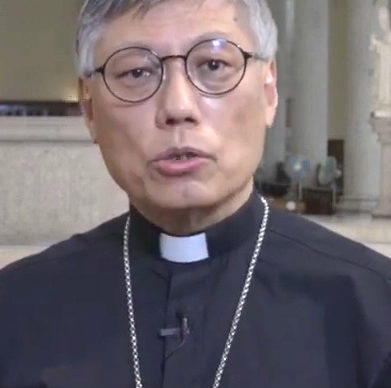
Newly Named Catholic Cardinal of Hong Kong Calls for Reconciliation, Increased Hope for Youth
- By Geoffrey Peters --
- 17 Jul 2023 --
A Hong Kong bishop whom Pope Francis personally selected to be included in the newest group of cardinals within the Catholic Church has expressed his desire for reconciliation and emphasized the need for the island to instill greater hope among youth in the wake of an economic decline and government efforts to suppress a pro-democracy movement.
On July 10, a day after the pope announced he had selected 21 new cardinals from around the world, Stephen Sau-yan Chow told reporters he wish for reconciliation for Hong Kong.
The new cardinals include Monsignor Pierbattista Pizzaballa, who serves as the Vatican’s highest-ranking official in the Middle East and holds the title of Latin Patriarch of Jerusalem.
This is what I hope [we] can achieve,” said the 64-year-old Chow, whose appointment as cardinal will be formalized on September 30.
Like Pizzaballa’s minority community, Chow leads Hong Kong’s Catholics in a region that holds great geopolitical significance for the Vatican. And like the pope, Chow is also a Jesuit.
Over the years, the Vatican and China have maintained a tumultuous relationship marked by periods of strain and occasional signs of amelioration. The main source of disagreement arises from China’s Communist government’s insistence that only it has the power to appoint bishops, which has resulted in the imprisonment of priests who exhibit allegiance to the pope.
On July 10, Chow expressed his disbelief upon hearing the news of his appointment as a cardinal—even though he will be the fourth prelate to be conferred with the honor in Hong Kong, a semi-autonomous territory of China. “It is a new mission—a mission that God assigned through the pope,” he told reporters.
In April, Chow embarked on a journey to Beijing, becoming the first bishop from the city to visit the Chinese capital in almost 30 years. Upon concluding his visit, he extended an invitation to the state-appointed archbishop of Beijing to visit Hong Kong, a symbolic gesture that experts believe has the potential to bolster the delicate relationship between China and the Vatican.
Prior to his trip to Beijing, Chow proposed a lenient approach toward protesters were arrested for relatively minor offenses during Hong Kong’s anti-government movement in 2019 who have yet to face charges.
In an article, the bishop expressed the view that such leniency would foster hope and positive energy among those who have been affected, as prolonging their uncertainty hinders the recovery of Hong Kong society.
The 2019 protests were initially triggered by an unpopular extradition bill, leading to a massive mobilization of hundreds of thousands from Hong Kong. In connection with the turmoil that gripped the city, over 10,000 individuals have been apprehended by the police. However, a considerable number of them remain uncertain about whether they will face charges.
Asked if he continues to advocate for more lenient treatment toward those who have been arrested, Chow expressed his aspiration for increased reconciliation and the provision of greater hope to the younger generation. “Especially for those who have made mistakes, so that they can have a future,” he added. “This is very important.”



















